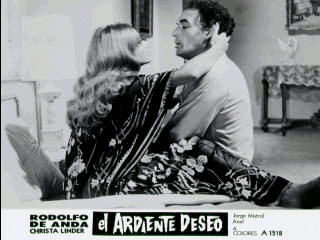
(Cine Visión-Prods. Raúl de Anda, 1970) Prod/Dir: Raúl de Anda Jr; Scr: Fernando Galiana; Story: Renée Dumas, Fernando Galiana; Photo: Fernando Colín; Music: Enrico Cabiati; Musical Arr/Theme: Ernesto Cortázar [hijo]; Prod Mgr: José L. Murillo; Asst Dir: Tito Novaro; Film Ed: Raúl J. Casso; Art Dir: Raúl Cárdenas; Camera Op: Agustín Lara; Camera Asst: Adrián Canales; Re-rec: Heinrich Henkel; Asst: Ricardo Saldívar; Recordist: Consuelo J. Rendón; Mkup: Antonio Ramírez; Script clerk: Rafael Villaseñor; Union: STIC; Eastmancolor and Mexiscope
CAST: Rodolfo de Anda (Carlos del Valle), Christa Linder (Silvia), Jorge Mistral (Gabriel), Anel (Irene), Enrique Pontón (plant prod. mgr.), Raúl Ferrer (Sergio Bernal), José L. Murillo (plant official), Carlos Bravo [y Fernández] (Juan, butler), John Kelly (Mr. Thompson), Enrique Palma, Crista von Humboldt (Mrs. Thompson), José Luis de Alva, Alicia Echverría
NOTES: this is a decent melodrama, not too original but reasonably well done. Christa Linder has one of her most prominent Mexican cinema roles in El ardiente deseo--in most of her other pictures she was forced to share the feminine limelight, but here she is definitely the star and Anel is clearly a supporting player. In addition to her usual long, blonde hair, Linder is also seen wearing a short black wig and a short platinum blonde wig. She has a nude swimming scene and two topless scenes (while Anel is briefly seen topless in bed with Rodolfo de Anda). Linder gets to play something more than a blonde sex symbol, and her part has some depth even if her actions aren't entirely rational throughout the course of the picture.
Carlos del Valle works in a factory owned by
his godfather, the middle-aged Gabriel. The two men are close (they even
share the same luxurious house), and Gabriel winks at Carlos' affair with
Irene, Gabriel's secretary. Gabriel returns from a long European trip
married to Silvia; Carlos offers to move out, but Gabriel insists the
house is big enough for them all. 
Time passes. One day, Gabriel asks Carlos to pick up Silvia in his place. During their conversation, Silvia reveals that she is Mexican, and was a secretary and then mistress to a rich man. When he went back to his wife, she bounced around Europe as the mistress of various men, before finally deciding to marry Gabriel. Her frank attitude disturbs Carlos. During one argument, Carlos tosses Silvia in the swimming pool: she sheds her robe and swims nude in front of him.
Later, she shows him an apartment she has owned since her previous stay in Mexico. One day, the sexual tension between them reaches its peak, and they make love. [This scene features a 360-degree tracking shot around the two lovers as they embrace, accompanied by some extremely loud and lush music] Carlos tries to break off the relationship but cannot. He even discovers Silvia and Irene have become friends (and lovers?) and in one scene a menage a trois is clearly suggested.
When Carlos accidentally discovers Silvia in the apartment with one of her former lovers, he goes to Gabriel and tries to warn his godfather about her. Gabriel becomes suspicious of Carlos' feelings about Silvia, and has a private detective gather evidence of their relationship. He gives Carlos an ultimatum: accept a two-year assignment in Brussels or leave the company.
Carlos and Silvia decide to kill Gabriel; they rig an underwater light in the swimming pool so Gabriel is electrocuted during an evening swim (a rather long and graphic scene as Gabriel screams, groans, grimaces and twitches). However, Carlos is shocked to learn (from Irene) that Silvia has turned over evidence which implicates him alone in the crime. Carlos goes to Silvia's apartment and confronts her. She admits she planned the whole thing from the start: she doesn't want to be poor again, but she has to have her freedom. Carlos says he loves her, then shoots and kills her.
This is another insular "sex lives of the rich and famous" melodrama, taking place in a very narrow, yet "cosmopolitan" world where the principals are financially well-off (yet still work for a living), speak multiple languages (Gabriel speaks English and Carlos French during the course of the picture), live in luxurious houses with fantastic gardens, swimming pools, and servants, and travel internationally at the drop of a hat. As such, the picture doesn't really have much to do with Mexico or Mexican society (as a point of information, of the 4 principal actors, only Rodolfo de Anda was born in Mexico: Linder was Austrian, Anel born in the U.S.A., and Mistral was Spanish). This is not a criticism (although some might consider it so), just an observation on a particular type of movie, not limited to Mexican cinema of course.
El ardiente deseo makes a few stabs at cinematic style: the 360-degree tracking shot, for instance (which is repeated at the climax, superimposed over a shot of Carlos holding the dying Silvia in his arms), and a few other filmmakers' tricks. But for the most part it is just a slick, fairly good-looking movie that manages to hold one's interest with delivering any real surprises.
Final note: in one sequence, John Kelly and Crista von Humboldt appear as Gabriel's gringo business associate and his wife. Kelly does nothing but eat and say "Good, good," while von Humboldt drinks steadily. Finally, Silvia asks her husband if either of their guests speaks or understands any Spanish. No, he replies. At this point, Linder (in Spanish) says she's bored and is going to scream unless she leaves; she asks Carlos to dance with her, and smilingly says to the gringos (in Spanish): "I can't stand you any longer." The businessman says to Gabriel (in English): "You know, I like your wife," and Gabriel replies (in English), "Me too."
Back to the Christa Linder Filmography
Posted 8 June 99 by dwilt@umd.edu